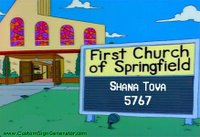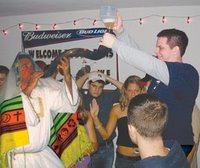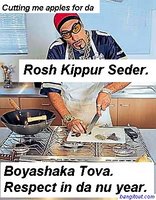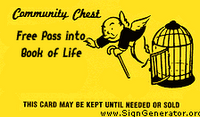I really like this Torah Portion and it is full of great things, like the
Ben Sorer U'Moreh (the rebellious son) and the laws of crushed testicles, but I remembered I already had something written for this one that I had not yet posted, something
IMHO is pretty gosh darn good.
I delivered the first Dvar Torah of the School Year last year at the school-wide Seudah Shlishit which happened to be on this Torah Portion, Ki Tetze. This Dvar Torah is frought with controversy and I still like it a lot. Here is, I believe, the draft I presented (When I write a spoken Dvar Torah I often write multiple drafts). Note that I often place a charge at the end of my public Divrei Torah and this particular one is directed toward the students at the
Columbia/Barnard Hillel.:
Dvar Torah
Matt Rutta
Parashat Ki Tetze (9/17/05)
Seudah Shlishit
If any parasha full of laws and no narrative was considered the fun one, Ki Tetze would probably a top candidate. Talmudic commentary aside, on the surface it gives our parents the right and ability to put us to death if we do something they don't like and there are a couple of colorful laws on the issue of not castrating or gelding one’s self. There are also the laws of marrying one’s late brother’s wife, or otherwise spitting on his face and throwing his shoe. Cross-dressing, shooing mother birds, captive women, even parapets!! It’s all here! It is really a beautiful parsha full of chukim and mishpatim for us to unquestionably observe and merit a close examination of each and every one of them. However, since I have only been given a half hour, I would like to focus on two of them. The law of the Mamzer and the law of the Moabite.
Oh, don’t look so horrified! I’m just kidding.
A Mamzer, a bastard, is forbidden to enter the Congregation of the Lord, even unto the 10th generation. One such mamzer is Peretz, the product of a forbidden relationship of Judah and his betrothed daughter-in-law Tamar.
Another law that immediately follows is that a Moabite cannot enter the Congregation of the Lord even unto the 10th generation. What about Ruth, herself the descendent of the incestuous coitus of Abraham’s nephew Lot and one of his daughters; Ruth the Moabite who enters the fold of the Jewish people and marries Boaz?
Both Peretz and Ruth are the progenitors of King David, who himself is the progenitor of the eternal line of Jewish Kings and the Messiah. The final verses of the book of Ruth testify to the ten generations between Judah’s illegitimate son and the Anointed of Israel and the law of the mamzer found in this week’s parasha goes out of its way to point out specifically “also the tenth generation”.
King David has his own indiscretions. He commits adultery with Batsheva, the wife of one of his generals, Uriah. This parasha also forbids adultery, and he had blood on his hands in consigning Uriah to death in battle! However, the son that results from this relationship, Solomon, ends up as the heir to the throne and the line of the messiah.
A mamzer and a Moabite are not necessarily evil and it isn't even their fault. A mamzer is a mamzer due to the sins of their parents. A Moabite is a Moabite due to their lineage. But Judaism is hazy on the sins of the father unto the son. Wickedness will be repaid unto the third and fourth generations but righteousness will be rewarded even after thousands of generations. The fact that the destitute Peretz and Ruth are able to overcome adversity and taboos that they were inadvertently born into did not phase them; their ignoble beginnings turned into the ancestry of royalty. In fact, the penultimate stanza of the Lecha Dodi declares:
ימין ושמאל תפרוצי, ואת ה' תעריצי, על-יד איש בן פרצי, ונשמחה ונגילה
“Right and left you shall spread out, and you shall appreciate God through the man who is decended from Peretz, and we shall be happy and rejoice”.
Rabbi Alkabetz who composed this piyyut decided to honor the name of Peretz who is the ancestor of King David.
What is the history of the Jewish people? Do we say we started as kings or in some exalted position? No! "We were slaves to pharaoh in Egypt". "My father was a wandering Aramean." We don't start out in glory; we have to work for it. Our ancestors were shepherds and farmers. Deeds should speak louder than pedigree. Yerushalayim means something that is completely a heritage, something we have earned. Sure it was promised to our forefathers, but we ourselves have merited it.
The first High Priest, Aaron’s wife, Elisheva was also a descendent of Peretz. According to Torah Law, the Kohen Gadol’s wife must be of unblemished Israelite lineage and yet we see that the wife of the High Priest and the mother of all Kohanim is halachically a mamzeret, a bastardess.
Both the lines of anointed Kingship and holy and pure Priesthood are forever tainted with sexual indiscretion. Yet they were able to overcome the stigma of halachic defects and achieve perpetual greatness and an unceasing line of descendents of whom is demanded purity and closeness to God.
There is a beautiful story told by the great Yiddish author Yud Lamed Peretz, (no relation to the son of Judah and Tamar), of Bonshe Shveyg, Bonshe the Silent, who was kind of similar to Job. Bonshe was, as his name implied, unheard in his life. Like Job he never complained about his suffering, and yet he suffered nonetheless. Unlike Job who started out wealthy and was simply a product of a test by Satan, Bonshe was born into silent suffering, lived his short miserable life in silent suffering, and died a painful death alone and in silent suffering. He never felt the loss that Job had because he never had anything. He passed as a shadow from the earth and even his simple gravemarker was blown away from its weak foundation. However, he never uttered one disparaging word about his raw lot. He was given a hero’s welcome into Olam HaBa and announced by the great Shofar and greeted by
Avraham Avinu. During his trial that one may go through when their eternity is decided, the Senegor, the angel Michael who acts as a defense attorney for all Jews, retells the pitiful short life of the silent man, and ironically, the
Kategor, the prosecutor, also known as
Satan himself, is silenced, not able to say a single condemning remark against the silent defendant. Bonshe wins his trial. God, who is the King of Judgment, tells Bonshe he can have anything he wants. What does Bonshe ask for his eternal reward? He politely requests a daily portion of warm bread and butter.
The defense-attorney angel hid his face in shame. The prosecuting-attorney angel smiled a bitterly mordant smile of triumph. And the Almighty G-d wept...
Unfortunately, Bonshe lacked initiative in his life and passed as a shadow, leaving no impression of himself, metaphorically and literally, upon the earth. My charge to you is to take initiative. If the House of Aaron and the House of David could overcome the adversity of being the outcasts of society and become the greatest leaders the Jewish people and the world have ever known, kal v’chomer, so much the moreso, you can!
Finally, in Pirkei Avot we read,

“Rabbi Shimon said, there are three crowns: The Crown of Torah, the Crown of Priesthood, and the Crown of Kingship. But the Crown of a good name trumps them all.”
If you’re not already, become a leader active in Hillel. Repair the world through Tzedek projects. Speak out and make yourself heard. Don’t be silent. Overcome adversity. Be excellent to each other. Do something worthwhile. You have the option of being a Bonshe or a David. If you make a good name for yourself, like the monarchy and the priesthood, you too will have an eternal legacy.
K’tiva V’Chatima Tova, May you all be inscribed for a good year! Shabbat Shalom!





